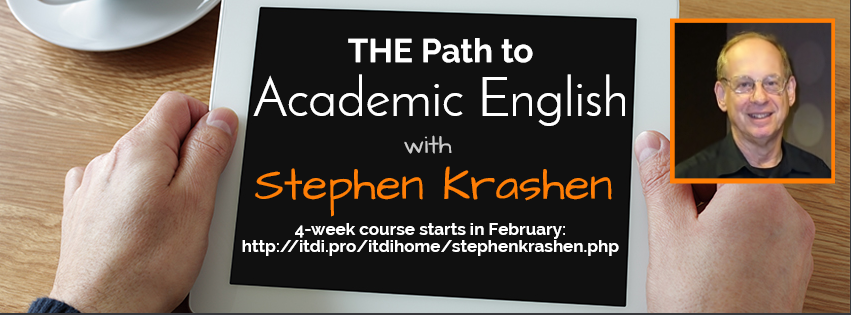 Stephen Krashen
Stephen Krashen
The Monitor Hypothesis says that consciously learned language is available as a Monitor, or an editor. We think about rules before we say/write something or after, and make corrections when we realize what we said, or are about to say, is wrong. The conditions for the use of the Monitor are severe: The performer has to (1) Know the rule; (2) Be thinking about correctness (3) Have time to retrieve and apply the rule. (Krashen, S. 1981. Second Language Acquisition and Second Language Learning. New York: Prentice-Hall. Out of Print.)
Over-use of the Monitor (Krashen, 1981) happens when Monitor-use interferes with communication, when we are over-concerned with correctness (Hemingway, 1927; Berra, no date). Knowledge of grammar does not make a significant contribution to communication (Walker, 2002).
Hemingway on the overuse of the Monitor:
“The major, who had been the great fencer, did not believe in bravery, and spent much time while we same in the machines correcting my grammar. He had complimented me on how I spoke Italian, and we talked together very easily. One day I had said that Italian seemed such an easy language to me that I could not take a great interest in it; everything was so easy to say. ‘Why, then, do you not take up the use of grammar?’ So we took up the use of grammar, and soon Italian was such a difficult language that I was afraid to talk to him until I had the grammar straight in my mind.”
Ernest Hemingway, “In Another Country.” In Men without Women, Scribner, paperback fiction. 1997, p. 46-47. Originally published 1927.
Baseball star Yogi Berra on the overuse of the Monitor:
“You can’t think and hit at the same time.”
Limits of grammar knowledge in real production and comprehension.
Letter to the London Times, August 29, 2002
Sir: While my wife (1953 O-level French, fail) happily bargains with French market stallholders, I (1953, A-level French, pass) and only stand by muttering “No, tomatoes are feminine” or “You should be using the subjunctive!”
I was even able, when paying the bill at a small hotel, to say beautifully and accurately in French: “Had we not been awoken at 3am by the dustcart, it would not have been necessary for us to have raided the mini-bar for a bottle of water.”
Unfortunately I had to reply on my wife to understand the reply: “Sorry, but it is still going to cost you 50 francs.”
Yours faithfully,
H.L.M. Walker
Saffron Waldon, Essex.
Subcribe to Stephen Krashen’s Blog where you’ll find this paper and many more on a variety of topics of interest and concern.
Get iTDi certified in teaching academic language with Stephen Krashen. Join Stephen Krashen for his iTDi Advanced Course THE Path to Academic English. Live sessions with Dr. Krashen begin February 7th. All classes are recorded.


